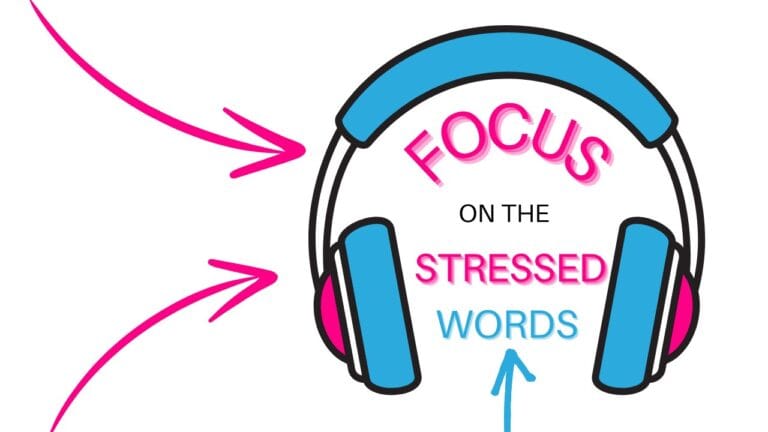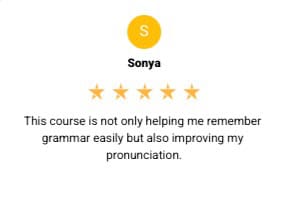Improve Your Listening Skills: Notice Sentence Stress
👇 Take this lesson with you! 👇
Table of Contents
If you want to improve your listening skills, stop focusing on understanding each and every word. Instead you need to focus on sentence stress. In this lesson I will show you how.
How to Improve your English Listening Skills
I think the biggest mistake students make when listening to English is they try to understand every single word.
If you do this, then you will get lost quickly, you won’t be able to keep up, and finally you will give up.
The secret – the one thing you should do, is to focus on gist. ‘Gist’ is the overall, general idea. Just try to understand the general idea, not every word.
How can you do that?
You focus on identifying the stressed words in a text. These are the key ones you really need in order to understand what someone is saying. Teachers and linguists usually call this sentence stress.

What is Sentence Stress?
Sentence stress refers to the words we stress in a sentence.
We stress the most important ones – usually the nouns, verbs, adjectives, adverbs, rather than not the prepositions, pronouns, and question words. For example,
I live in a town near London
verb noun noun
Why is Sentence Stress Important?
1) Not all languages do this.
Some languages tend to stress each word almost equally. For example, Chinese and Spanish tend to stress each syllable, at least much more than English.
English, on the other hand, is more of a stress-timed language. So, we English speakers tend to put the stress at equal time intervals, rather than on each syllable.
You can see or hear this in the following two phrases. The stress falls at the same time, despite the number of words and syllables being different.
I live in a town near London
I’ve been living in this town just near London for years
2) This is a strategy native speakers use
Native speakers listen to stressed words to help identify the important or new information. We don’t listen out for ‘grammar words’ (e.g. have been, would, will, etc..) so much because we are so used to grammar patterns, that we will recognise the tense immediately.
However, imagine I am in a busy disco or speaking to someone over the phone – I will have strategies to help me understand what I can’t hear.
One of them is focus on the key, stressed words. Of course, I will also use context to confirm the tense and overall meaning. Sometimes I will just guess.
All of these are listening strategies you should also develop.
- Listen for stressed words
- Use the Context
- Guess
3) Section Sentence stress can change the meaning
We can use sentence stress to change the meaning of a sentence too. Take the example below,
I live in a town near London
The stressed words provide the important or new information. However, I could change the meaning of this phrase by stressing different words. For example,
I live in a town near London
This change in emphasis could be used to clarify I don’t live far away from London. The word ‘town’ is probably still stressed but less so, as it has less importance.
Of course, do remember context and intonation are also important when deciding what something really means.
But knowing about sentence stress is essential and will really help you understand native English speakers.
Whatever your level of English, there will always be things you don’t understand. Accept it.
Don’t try to understand everything, focus on stressed words.
Focus on understanding the overall meaning.
Focus on gist.

Tips for Improving Your Listening Skills
1) Do dictations with very short listening texts
Listen to short texts or dialogues of 2 to 3 sentences, maybe around 30 seconds. Do the following
- Listen once and write the key words
- Listen again and add more key words
- Listen again and try to write out everything you hear
- Check your answer with the tape script
This is what we do a lot in the Gold course live lessons, it really helps and I think students enjoy it.
2) Do plenty of longer listening
Listen to news stories, podcasts, movies and TV shows. Don’t look up any words, don’t take notes, just listen. The idea is to just focus on the overall meaning. It shouldn’t feel like studying. It should be fun.
3) Change your expectations
Don’t expect to understand everything. When you listen to English, be ready to not understand things, to just let somethings go by. The important thing is you get the overall meaning.
4) Listen to English at least one hour a day
Plan and organise your day to include English listening sessions. Maybe 20 minutes before everyone wakes up, 15 minutes on your commute, 10 minutes on your daily walk after lunch, 20 minutes in the gym, or even 20 minutes before bedtime.
5) Stop using subtitles
They encourage you to focus on each word, not stressed words. Try watching some things without subtitles so you start to train your ear to pick up the general meaning without focusing on every single word.
There you go, now you know what sentence stress is, why it’s important and how to practice it, what are you going to do?
Let me know your plan in the comments below
Improve your Speaking Skills with this Free Course
Crack IELTS Speaking Part 1
Learn to Speak with Confidence in Part 1 of Your IELTS Test!
⭐️⭐️⭐️⭐️⭐️
‘It’s such a great course. I’ve learned so many usages for speaking part 1.’
Zu Htet





